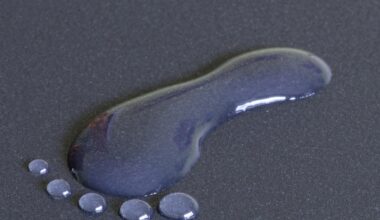The Benefits of Melatonin Supplements for Athletes
Melatonin supplements have gained popularity among athletes seeking natural remedies for improved sleep. This hormone, produced by the pineal gland, regulates sleep-wake cycles. Athletes often experience disrupted sleep patterns due to rigorous training, travel, and competition stress. Supplementing with melatonin can assist in managing these issues, leading to better sleep quality. Research indicates melatonin can shorten the time it takes to fall asleep, which is essential for recovering from intense physical activity. By optimizing sleep, athletes can enhance their overall performance. Furthermore, melatonin helps regulate circadian rhythms, which may be particularly beneficial for those traveling across time zones. Improved sleep can lead to heightened alertness during training and competitions. A balanced sleep cycle supports cognitive functions, aiding in focus and decision-making during critical moments in sports. Athletes must consider dosages carefully and consult professionals before introducing melatonin. Despite its benefits, individual responses to melatonin can vary, so monitoring effects is vital. Incorporating melatonin as part of a broader recovery strategy can promote better rest and recovery, thus optimizing athletes’ performance in their respective sports.
Understanding Melatonin’s Role in Sleep
Melatonin plays a vital role in how individuals experience sleep. This hormone signals the body when it is time to sleep, promoting a sense of drowsiness. For athletes, ensuring effective melatonin production is essential for reaping recovery benefits. Activities such as weightlifting, endurance training, or skill practices induce physical and mental stress. This stress can disrupt natural hormone levels, leading to sleep difficulties. In this context, melatonin supplementation serves as a helper, restoring balance for optimal performance. Adequate sleep is crucial for muscle recovery, immune function, and overall health—factors significant for athletes’ success. As melatonin levels increase in the evening, it engages biological processes that promote deep sleep phases, which are essential for repairing muscles and tissues. Supporting effective melatonin production naturally involves good sleep hygiene practices, such as avoiding screens before bed and establishing regular sleep schedules. Athletes can benefit from keeping the sleeping environment dark and cool, further maximizing melatonin’s effects. By making informed choices regarding sleep and using melatonin supplements appropriately, athletes can harness this hormone’s potential to enhance recovery and performance outcomes.
One of the standout benefits of melatonin supplementation is its sleep-promoting capabilities, particularly for athletes adjusting to irregular schedules. Training camps, competitions, and travel can often disrupt an athlete’s sleep patterns. When sleep becomes irregular, hormone levels can fluctuate, potentially undermining physiological recovery. Melatonin supplements can serve as a compensatory mechanism to mitigate the effects of these disruptions. Research has shown melatonin is particularly effective in addressing sleep latency—the time it takes to fall asleep. For athletes needing quick rest between sessions, rapid sleep onset is crucial. Moreover, melatonin has been found to improve overall sleep quality by promoting longer sleep duration and increasing the percentage of time spent in restorative sleep stages. These improvements are associated with enhanced cognitive function and performance. Furthermore, a good night’s sleep has profound effects on mood regulation, which is crucial for athletes facing the psychological demands of competition. Integrating melatonin with other recovery methods, such as hydration strategies and nutrition, can lead to a holistic approach that enhances athlete performance and well-being.
Exploring Dosage and Timing
For athletes considering melatonin supplements, understanding the appropriate dosage and timing is crucial. There is no one-size-fits-all answer, as individual responses to melatonin can vary significantly. Most research suggests dosages between 0.5mg to 5mg taken approximately 30 to 60 minutes before bedtime. Starting with lower doses can help gauge individual sensitivity and effectiveness before increasing. It is also essential to consider timing; taking melatonin too late may disrupt regular sleep patterns rather than aid them. Athletes should ideally aim to align melatonin intake with their natural sleep cycles. Experimenting with dosage and timing may involve some trial and error. Additionally, maintaining consistency from night to night can reinforce melatonin’s effectiveness. Athletes should also consult with health professionals to develop a personalized plan that minimizes potential side effects. By leveraging proper dosage and timing, athletes can enhance recovery, leading to improved overall performance levels. This tailored approach can be combined with other non-pharmaceutical sleep strategies for a more comprehensive effect.
Incorporating melatonin supplements requires understanding potential side effects and interactions for athletes. While generally considered safe, some individuals may experience side effects like daytime drowsiness, headaches, or dizziness. Monitoring how melatonin affects personal performance and daily activities is essential, especially during critical training or competition periods. There is also potential for melatonin interaction with various medications. Athletes currently taking other supplements or medications must be particularly vigilant. Consulting healthcare professionals specializing in sports medicine can provide valuable guidance. They can help ensure melatonin’s integration into recovery strategies is both safe and effective. Additionally, athletes should avoid excessive reliance on supplements. Prioritizing natural sleep hygiene practices is crucial for sustainable improvement in sleep quality. Examples include regular exercise, balanced nutrition, and creating a relaxing bedtime routine. Aim for consistency in sleep hours to stabilize circadian rhythms, thereby supporting natural melatonin production. While melatonin supplementation can provide benefits, it should be part of a comprehensive sleep strategy rather than a sole solution. Focusing on holistic recovery practices will yield the best outcomes and support athletic performance in the long run.
Long-term Effects of Melatonin Use
Understanding the long-term effects of melatonin supplementation is important for athletes. While short-term use can improve sleep quality significantly, ongoing studies seek to clarify if prolonged use presents risks or benefits. Some research indicates that long-term melatonin use is generally safe for most individuals. However, the effects on natural sleep regulation must be considered. Regular use could potentially diminish the body’s capacity to produce melatonin independently, leading to dependence. Athletes should evaluate their sleep patterns to determine if periodic breaks from supplementation are necessary. Additionally, assessing personal recovery needs can help balance melatonin supplementation with healthy sleep hygiene practices. Long-term melatonin users often report improved sleep onset and overall sleep quality, which can contribute positively to performance consistency. However, more comprehensive research is needed to clarify any potential long-term ramifications for athletes. By not overly relying on supplements, athletes can better support their natural sleep cycles. Understood as a tool rather than a crutch, melatonin can facilitate recovery, with the best effects occurring when complemented by consistent health and recovery practices.
In conclusion, melatonin supplements present a promising option for athletes seeking natural remedies to improve sleep quality and recovery. Recognizing its benefits, understanding proper dosage and timing, and being aware of potential side effects are all essential components of utilizing melatonin effectively. Given that sleep is integral to athletic performance, fostering improved sleep hygiene alongside melatonin use can yield the best outcomes. Athletes should prioritize their health by pursuing professional advice, ensuring any supplementation regimen is suitable for their individual needs. The role of melatonin supplements in enhancing sleep will only be genuinely optimized when combined with holistic strategies. These include mindfulness practices, proper nutrition, and suitable physical activity. Maintaining balance and integrating these methods into their daily lives will bolster recovery efforts. As sleep remains a fundamental component of athletic success, making informed choices regarding melatonin use is crucial. Hence, athletes should be proactive in crafting personalized approaches to overcome sleep challenges—ultimately, leading to enhanced recovery and improved competitive performance.
Adopting a comprehensive lifestyle that emphasizes quality sleep and recovery strategies can bring athletes closer to achieving their peak performance consistently.


